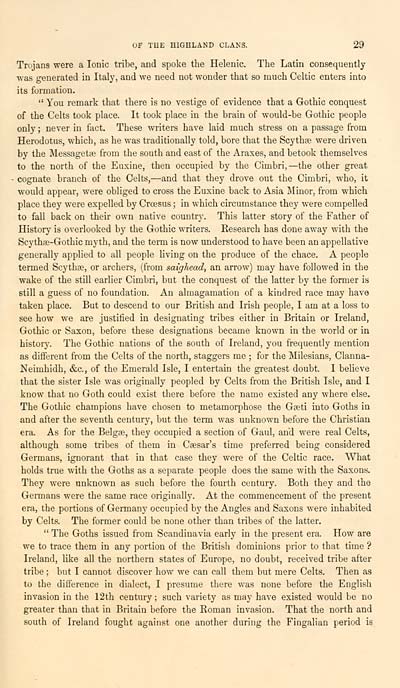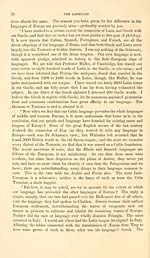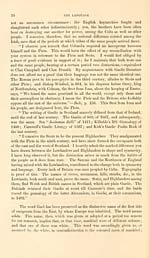Download files
Complete book:
Individual page:
Thumbnail gallery: Grid view | List view

OF THE HIGHLAND CLANS. 29
Trojans were a Ionic tribe, and spoke the Helenic. The Latin consequently
was generated in Italy, and we need not wonder that so much Celtic enters into
its formation.
" You remark that there is no vestige of evidence that a Gothic conquest
of the Celts took place. It took place in the brain of would-be Gothic people
only ; never in fact. These writers have laid much stress on a passage from
Herodotus, which, as he was traditionally told, bore that the Scythse were driven
by the Messagetre from the south and east of the Araxes, and betook themselves
to the north of the Euxine, then occupied by the Cimbri, — the other great
cognate branch of the Celts, — and that they drove out the Cimbri, who, it
would appear, were obliged to cross the Euxine back to Asia Minor, from which
place they were expelled by Crcesus ; in which circumstance they were compelled
to fall back on their own native countrj'. This latter story of the Father of
History is overlooked by the Gothic writers. Eesearch has done away with the
Scythse-Gothic myth, and the term is now understood to have been an appellative
generally applied to all people living on the produce of the chace. A people
termed ScythiE, or archers, (from saighead, an arrow) may have followed in the
wake of the still earlier Cimbri, but the conquest of the latter by the former is
still a guess of no foundation. An almagamation of a kindred race may have
taken place. But to descend to our British and Irish people, I am at a loss to
see how we are justified in designating tribes either in Britain or Ireland,
Gothic or Saxon, before these designations became known in the world or in
history. The Gothic nations of the south of Ireland, you fi'equently mention
as different from the Celts of the north, staggers me ; for the Milesians, Clanna-
Neimhidh, &c., of the Emerald Isle, I entertain the greatest doubt. I believe
that the sister Isle was originally peopled by Celts from the British Isle, and I
know that no Goth could exist there before the name existed any where else.
The Gothic champions have chosen to metamorphose the Gfeti into Goths in
and after the seventh century, but the term was unknown before the Christian
era. As for the Belgre, they occupied a section of Gaul, and were real Celts,
although some tribes of them in Csesar's time prefeiTed being considered
Gei-mans, ignorant that in that case they were of the Celtic race. What
holds true with the Goths as a separate people does the same with the Saxons.
They were unknown as such before the fourth century. Both they and the
Germans were the same race originally. At the commencement of the present
era, the portions of Germany occupied by the Angles and Saxons were inhabited
by Celts. The former could be none other than tribes of the latter.
" The Goths issued from Scandinavia early in the present era. How are
we to trace them in any portion of the British dominions prior to that time ?
Ireland, like all the northern states of Europe, no doubt, received tribe after
tribe ; but I cannot discover how we can call them but mere Celts. Then as
to the difference in dialect, I presume there was none before the English
invasion in the 12th centm-y ; such variety as may have existed would be no
greater than that in Britain before the Roman invasion. That the north and
south of Ireland fought against one another during the Fingalian period is
Trojans were a Ionic tribe, and spoke the Helenic. The Latin consequently
was generated in Italy, and we need not wonder that so much Celtic enters into
its formation.
" You remark that there is no vestige of evidence that a Gothic conquest
of the Celts took place. It took place in the brain of would-be Gothic people
only ; never in fact. These writers have laid much stress on a passage from
Herodotus, which, as he was traditionally told, bore that the Scythse were driven
by the Messagetre from the south and east of the Araxes, and betook themselves
to the north of the Euxine, then occupied by the Cimbri, — the other great
cognate branch of the Celts, — and that they drove out the Cimbri, who, it
would appear, were obliged to cross the Euxine back to Asia Minor, from which
place they were expelled by Crcesus ; in which circumstance they were compelled
to fall back on their own native countrj'. This latter story of the Father of
History is overlooked by the Gothic writers. Eesearch has done away with the
Scythse-Gothic myth, and the term is now understood to have been an appellative
generally applied to all people living on the produce of the chace. A people
termed ScythiE, or archers, (from saighead, an arrow) may have followed in the
wake of the still earlier Cimbri, but the conquest of the latter by the former is
still a guess of no foundation. An almagamation of a kindred race may have
taken place. But to descend to our British and Irish people, I am at a loss to
see how we are justified in designating tribes either in Britain or Ireland,
Gothic or Saxon, before these designations became known in the world or in
history. The Gothic nations of the south of Ireland, you fi'equently mention
as different from the Celts of the north, staggers me ; for the Milesians, Clanna-
Neimhidh, &c., of the Emerald Isle, I entertain the greatest doubt. I believe
that the sister Isle was originally peopled by Celts from the British Isle, and I
know that no Goth could exist there before the name existed any where else.
The Gothic champions have chosen to metamorphose the Gfeti into Goths in
and after the seventh century, but the term was unknown before the Christian
era. As for the Belgre, they occupied a section of Gaul, and were real Celts,
although some tribes of them in Csesar's time prefeiTed being considered
Gei-mans, ignorant that in that case they were of the Celtic race. What
holds true with the Goths as a separate people does the same with the Saxons.
They were unknown as such before the fourth century. Both they and the
Germans were the same race originally. At the commencement of the present
era, the portions of Germany occupied by the Angles and Saxons were inhabited
by Celts. The former could be none other than tribes of the latter.
" The Goths issued from Scandinavia early in the present era. How are
we to trace them in any portion of the British dominions prior to that time ?
Ireland, like all the northern states of Europe, no doubt, received tribe after
tribe ; but I cannot discover how we can call them but mere Celts. Then as
to the difference in dialect, I presume there was none before the English
invasion in the 12th centm-y ; such variety as may have existed would be no
greater than that in Britain before the Roman invasion. That the north and
south of Ireland fought against one another during the Fingalian period is
Set display mode to: Large image | Transcription
Images and transcriptions on this page, including medium image downloads, may be used under the Creative Commons Attribution 4.0 International Licence unless otherwise stated. ![]()
| Early Gaelic Book Collections > Blair Collection > Treatise on the language, poetry, and music of the Highland clans > (41) |
|---|
| Permanent URL | https://digital.nls.uk/76236854 |
|---|
| Description | A selection of books from a collection of more than 500 titles, mostly on religious and literary topics. Also includes some material dealing with other Celtic languages and societies. Collection created towards the end of the 19th century by Lady Evelyn Stewart Murray. |
|---|
| Description | Selected items from five 'Special and Named Printed Collections'. Includes books in Gaelic and other Celtic languages, works about the Gaels, their languages, literature, culture and history. |
|---|

